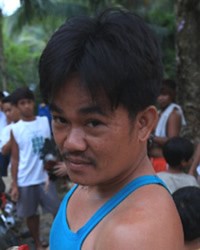Bikol, West Albay in Philippines

Photo Source:
Copyrighted © 2026
International Mission Board-SBC - Jen Hagen All rights reserved. Used with permission |
Send Joshua Project a map of this people group.
|
| People Name: | Bikol, West Albay |
| Country: | Philippines |
| 10/40 Window: | No |
| Population: | 329,000 |
| World Population: | 329,000 |
| Primary Language: | Bikol, West Albay |
| Primary Religion: | Christianity |
| Christian Adherents: | 95.00 % |
| Evangelicals: | 13.00 % |
| Scripture: | Translation Started |
| Ministry Resources: | No |
| Jesus Film: | No |
| Audio Recordings: | No |
| People Cluster: | Filipino, Tribal |
| Affinity Bloc: | Malay Peoples |
| Progress Level: |
|
Introduction / History
Although the various people groups that live in the Philippines have similar cultures, there are many small language groups. These are scattered primarily on the islands of Luzon and Mindanao. some have remained isolated from modernization and still live a lifestyle based on survival. Others are blending in with the greater Filipino communities.
Language is the chief distinguishing feature within West Albay Bikol culture. The speak their own language, by the same name.
What Are Their Lives Like?
The West Albay Bikol are farmers. The principal crops are wet rice and maize; while vegetables, tobacco, and coffee are grown as secondary crops. Some domestic animals such as dogs, goats, and chickens are also raised on the farms.
The most common method of farming is in "swidden" fields. (These are temporary gardening plots produced by cutting back and burning off the existing vegetation.) The plots usually lie adjacent to their homes. The farmers also depend heavily on irrigated rice terraces located on mountain slopes. Such "slash and burn" techniques bring a low agricultural yield, and destroys many of the forests.
Most of the tribal villages are arranged in clusters around individual gardens. The basic unit of society among these tribes is the extended family. Marriages are most often arranged while the prospective bride and groom are still very young. Since the tribes have strict taboos on sexual relations between relatives, most marriages are "exogamous," or with members of another tribe.
Depending on the influence of outside cultures, the clothing of the tribes varies. Some wear simple loin cloths, while others wear modern clothes.
Most West Albay Bikol villages have a headman or chief who acts as a judge of local disputes and a defender of their people's rights when challenged by outsiders.
What Are Their Beliefs?
The West Albay Bikol are officially Christian. That can mean Roman Catholicism, which in the Philippines blends with animistic practices. Others are strong Christian believers who follow the Lamb of God who takes away the sins of the world.
What Are Their Needs?
Although the West Albay Bikol are slowly being forced into a modern world, they continue to struggle with basic essentials. They are in desperate need of quality medical care, modern farming techniques, and educational opportunities.
Prayer Points
Ask the Lord to call West Albay Bikol people to disciple many others for Christ's glory.
Ask God to strengthen, encourage, and protect West Albay Bikol Christians, and give them joy in experiencing life to the full.
Pray for the West Albay Bikol people to have the spiritual hunger it takes to turn away from spiritual practices that keep them away from the Lord of lords.